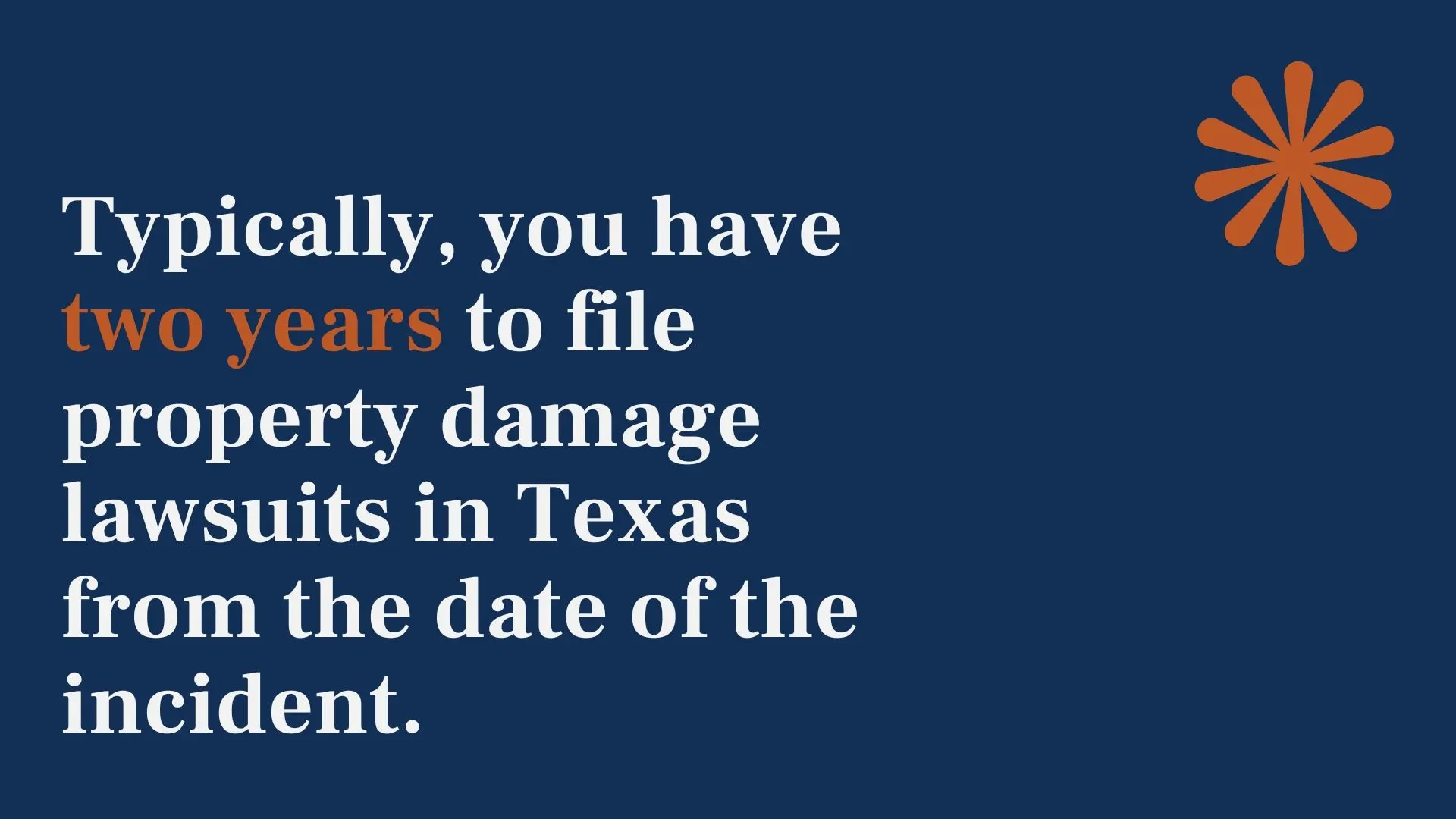Dealing with property damage can be a distressing experience, and understanding the legal time limits associated with filing a claim in Texas is critical. This post will walk you through the essential information regarding the statute of limitations for property damage cases in Texas.
Whether you're a homeowner, business owner, or tenant, it’s imperative that you have a good grasp of this legal timeline to protect your rights and ensure that you receive fair compensation. Here’s what you need to know about making property damage claims in the Lone Star State.
What Is a Statute of Limitations?

A statute of limitations is like a clock ticking in the background of many legal matters, including property damage claims. It’s an official time limit that dictates how long you have to take legal action after an incident. In other words, it's the "use it or lose it" deadline for exercising your legal rights.
In Texas, the relevant laws regarding property damage claims and their associated statute of limitations are outlined in the Texas Civil Practice and Remedies Code, Title 2, Chapter 16. This statute sets the general time limit for personal injury and property damage claims, which includes property damage cases.
Deadline for Property Damage Lawsuits in Texas

Under Texas Civil Practice & Remedies Code Section 16.003, Texas typically imposes a two-year deadline from the date of the initial incident that caused the damage. That means you have a two year period to initiate legal action to recover compensation.
Keep in mind, however, that this limitations period can be affected by specific circumstances and exceptions. To make sure you have time on your side, consult an experienced Texas property damage lawyer, who can advise you on the particulars of your case.
What Types of Property Damage Is Covered?
The Texas statute of limitations for property damage claims applies to both real property (land, buildings, structures) and personal property (vehicles, furniture, belongings). Common property damage cases include:
- Car accident damage to vehicles
- Construction defects affecting homes or buildings
- Damage to other property caused by a responsible party's negligence
- Destroyed property from fires, floods, or storms
- Diminished value of the property after repairs
Exceptions to the Standard Statute of Limitations
Certain exceptions and special circumstances may affect the standard statute of limitations for property damage claims in Texas. The following are some common examples.
Involvement of Minors
If a minor (someone under 18 years of age) is the victim of property damage, the limitations period may be extended. The clock typically starts running when they reach the age of majority, which is 18 in Texas. This exception accounts for legal disability that prevents minors from filing civil lawsuits on their own.
Individuals with Disabilities
If someone has a legal disability or is of unsound mind that prevents them from pursuing legal action, the limitations period may be "tolled", or paused until they regain competence or otherwise have the means to file a claim.
Delayed Discovery

In some cases, the statute of limitations may start from the date of the discovery of the damage rather than the date on which it occurred. This usually applies when the damage isn't immediately apparent.
Fraud or Misrepresentation
If the responsible party engages in fraudulent conduct or conceals information related to the property damage, their actions may extend the statute of limitations. In such an instance, the clock will start running when the fraud or misconduct is discovered.
Governmental Immunity
Special rules and timeframes may apply in cases involving property damage claims against government entities. It's therefore wise to be aware of the specific statutes and requirements for suing government agencies.
It's highly recommended that you consult an experienced property damage claim lawyer to understand how these exceptions may apply to your situation.
Other Legal Considerations for Property Damage Claims
Handling property damage claims in Texas involves more than just knowing the limitations period. Various other factors and legal principles can impact your ability to recover compensation for property damage.
Texas Tort Claims Act
If your claim involves a government agency, the Texas Tort Claims Act imposes limitations and notice requirements that can affect your case. You must know the special rules and exceptions that apply when suing government entities. Many cases require you to provide written notice within specific timeframes.
Insurance Policies
Your insurance policies' specific terms and limitations can affect your property damage claim. For example, a given policy's coverage limits, deductibles, and exclusions can all influence the amount of compensation you can recover.
Contributory Negligence

Texas follows a modified comparative negligence system. If you're found to be more than 50% responsible for the property damage, you may be barred from recovering any compensation. Consider whether and how this principle applies to your case and how the responsible party's negligence contributed to the damage.
Statute of Repose
In some cases, a statute of repose may apply. A statute of repose establishes an absolute time limit for bringing claims for certain types of property damage, such as construction defects. This time limit may be unrelated to when the damage occurred or was discovered.
Notice Requirements
Depending on the exact circumstances and parties involved, you may be expected to meet specific notice requirements within a certain timeframe to preserve your right to bring a property damage claim.
Steps to Take After Discovering Property Damage
You've got enough on your mind if you recently discovered damaged property. Even so, it's important to take the right steps to protect your property rights and ensure that you don't miss any legal deadlines.
1. Document the Damage
Take clear, revealing photos and videos of the damage from multiple angles. Visual evidence will play a central role in supporting your claim.
2. Note the Date and Time
Record the date and time you first discovered the damage. This information will be useful for establishing when the damage-causing incident occurred.
3. Contact Your Insurance Company
Notify your insurance company about the property damage as soon as possible. Be prepared to provide detailed information about the incident and follow the steps required for your insurance claims process. Your insurance policy may have specific time limits for reporting claims.
4. Preserve the Available Evidence
Avoid making significant repairs or alterations to the damaged property until you've talked to your insurance company and legal counsel. Otherwise, you risk losing essential evidence.
5. Gather Relevant Documents

Collect any documents related to the property damage, such as repair estimates, invoices, and communication with your insurance company.
6. Seek Legal Counsel
Meet with a qualified property damage lawyer at your earliest convenience. They'll provide reliable guidance, ensure that you meet all legal deadlines, and advocate for your property rights. Request a free consultation to get a comprehensive case evaluation.
7. Review Your Insurance Policy
Familiarize yourself with your insurance policy's terms, coverage limits, and exclusions. You'll need to know your policy inside and out when pursuing a property damage claim.
8. Be Cautious with Any Statements You Make
Watch what you say when discussing the incident with insurance adjusters, the insurance company, or other parties. Avoid admitting legal responsibility or making statements that could be used against you to deny your claim.
9. Keep a Record
Maintain a comprehensive log of all communications related to the property damage claim, including emails, phone calls, and letters. You never know when the details of a given conversation will come in handy.
10. Adhere to the Relevant Legal Deadlines

Work closely with your lawyer to make sure you meet all legal deadlines for filing your property damage claim. Missing these deadlines can jeopardize your ability to recover damages.
Trust Omar Ochoa Law Firm for Your Property Damage Claim
Knowing Texas's statute of limitations for property damage claims is just the beginning. With so many complicated legal nuances and potential pitfalls, consulting a property damage lawyer is a necessity.
The seasoned legal professionals at Omar Ochoa Law Firm will prioritize your rights and interests in property damage claims in Houston, San Antonio, McAllen, and elsewhere across the great state of Texas. Contact us today to get the help you need and improve your chances of securing fair and adequate compensation for your property damage.

Omar Ochoa has been nationally recognized as one of the best young trial lawyers in the country. He's represented clients in federal and state courts and arbitrations throughout the United States and internationally. He is highly experienced in a wide range of complex litigation and has handled a variety of cases. He has recovered hundreds of millions of dollars for clients of all types — from individuals to mid-sized business owners to multi-national companies.
Table of Contents
Get Your Free Case Review — No Recovery, No Fee
Find out if you have a valid property damage claim. Our lawyers will review your case at no cost and fight for the fair settlement you deserve. Call (956) 253-3121 today.
Contact UsLorem ipsum dolor sit amet, consectetur adipiscing elit. Suspendisse varius enim in eros elementum tristique. Duis cursus, mi quis viverra ornare, eros dolor interdum nulla, ut commodo diam libero vitae erat. Aenean faucibus nibh et justo cursus id rutrum lorem imperdiet. Nunc ut sem vitae risus tristique posuere.
Contact UsDon't Let Time Run Out — Protect Your Property Rights Today!
Texas law gives you a limited window to file property damage claims. Schedule a free consultation with our insurance claim lawyers to discuss your case and explore your legal options before the two-year deadline expires.
Unsure Where to Start? Get a Free Case Review!
Every property damage case in Texas has unique circumstances that may affect the limitations period. Contact Omar Ochoa Law Firm today for a comprehensive case evaluation tailored to your situation.


